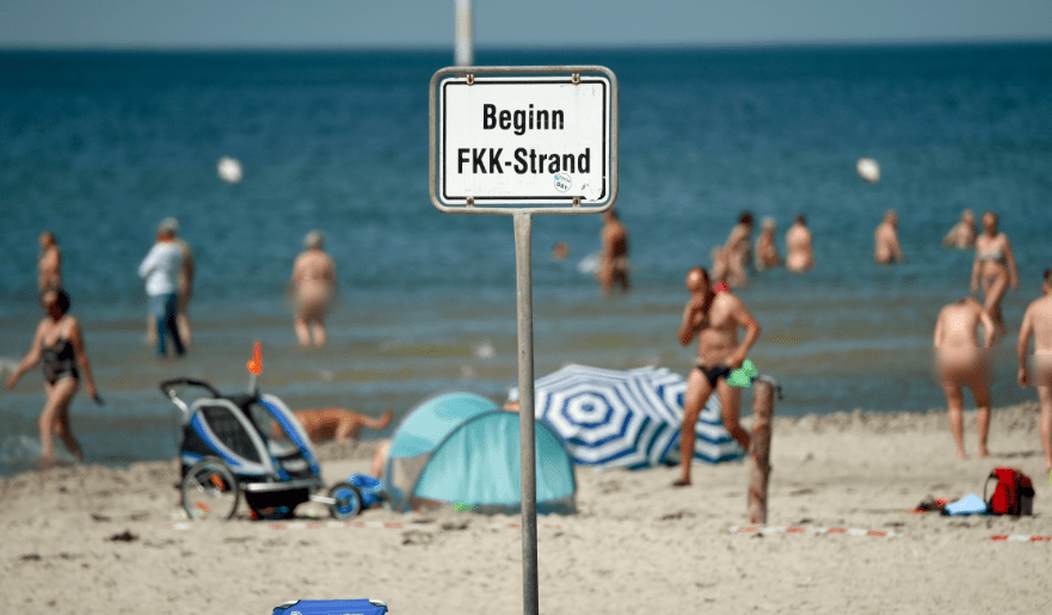Thousands of Germans take to the beach or the sauna — very public places — without wearing anything. Public nudity isn’t considered indecency, it’s considered culture.
The nudist movement goes by the initials FKK, which stand for Freikörperkultur, or “free body culture.” For Germans, nudity isn’t always sexual, and FKK has a long history, including a brief stint when it was banned by the National Socialists (Nazis) under Adolf Hitler.
Nudism “isn’t really erotic,” Gregor Gysi, president of the European Left party, told Deutsche Welle (DW)’s Rachel Loxton. “I see FKK as a possible counterweight to the ubiquitous sexualization in advertising, but also in society in general.”
Gysi, a 70-year-old politician, spoke out against the decline of FKK and called for more designated areas for nudists. He quoted a sex researcher to suggest that after the unification of Germany, the “pornographic gaze” of Westerners destroyed the pleasure of nude bathing that had been widespread in East Germany.
Loxton and Gysi argued that British people and Americans need to look beyond their own stigma against public nudity. “In Anglo culture, people tend to have a very different relationship to the body,” Annegret Staiger, a German-born associate professor of anthropology at Clarkson University in Potsdam, New York, told DW. “Where as if you go to Germany, Bulgaria, France, Austria… it’s a different story.”
“In the US people are scandalized about skin and at the same time make such a hype about showing it,” Staiger added.
Staiger outlined a brief history of the nudist movement in Germany. The first FKK organization launched in 1898 and spread around Berlin, the North Sea, and the Baltic Sea.
“Even at the turn of the century there was this movement away from the cities,” the professor explained. “It was part of a broader movement connected to not having the body constrained by things like corsets, and letting it breathe.”
This nudist culture did not involve sexualizing the body, but emphasizing health and freedom, Staiger argued. Nudism freed people from “shame, social inequality and from the unhealthy living environments in the crowded cities of early industrialization.”
While the Nazis initially banned FKK during World War II, the practice quickly returned, and a few have argued that the Nazi party adopted nudist culture. She referenced a propaganda film in which “nudism had become incorporated — at least to some extent — into the racial ideology of the Nazis.”
During the Cold War, FKK took on an anti-Communist meaning in East Germany, a place for people to escape the repressive Communist state.
“FKK culture has a long tradition in Germany,” Gysi explained. He said there were no separate beaches. Everyone, whether clothed or not, bathed together. “This was of dealing with nudity was lost after the country’s unification.”
The European Left politician insisted that the key to restoring FKK is local politics. He suggested politicians “can easily declare certain areas on beaches and in spas to be FKK areas and in doing so they should not be misled by investors (who don’t want nude people there).”
Unfortunately for the nudist movement, some sauna clubs have taken to selling sex under the FKK label.
“We have the issue of these sauna clubs or brothels that call themselves FKK sauna clubs, but they’re hiding behind the FKK label,” Staiger explained. These clubs “don’t have the spirit of FKK. They’re purely a euphemism to make it [prostitution] more acceptable.”
“FKK and nudist culture was about celebrating the body unencumbered by clothes, in nature and sunlight,” the professor added. “In FKK sauna clubs, only sex workers are naked, except for their six-inch high heels. That is not what the idea of FKK is about.”
Americans and British people might warn that encouraging a nudist culture in the modern world — especially with the advent of social media — will necessarily open the door to this kind of subversion. Germans will have to decide for themselves whether the American critique is bigoted or helpful.
Culture in general is becoming too global and local color is helpful. The rush to sexualize the naked body may be a particular weakness of Western culture, but all the same, most Americans and Brits would prefer if people just kept their clothes on.









Join the conversation as a VIP Member